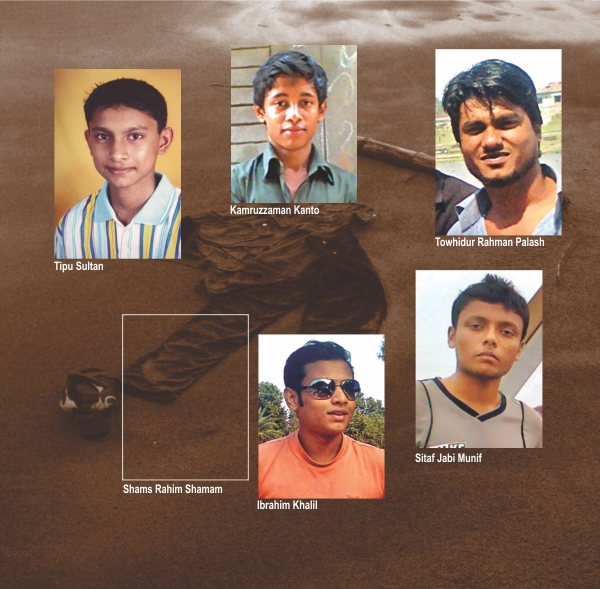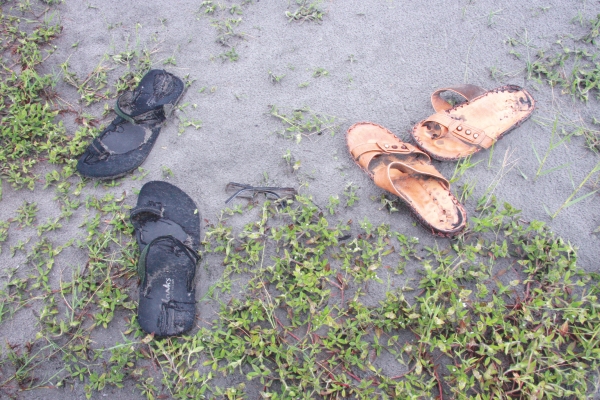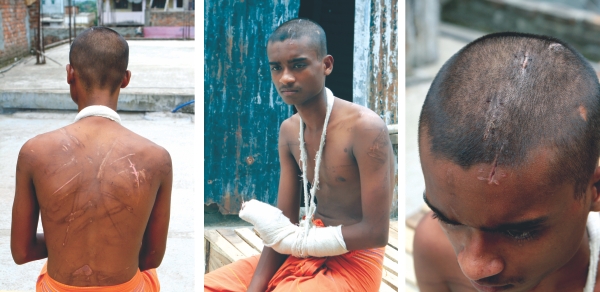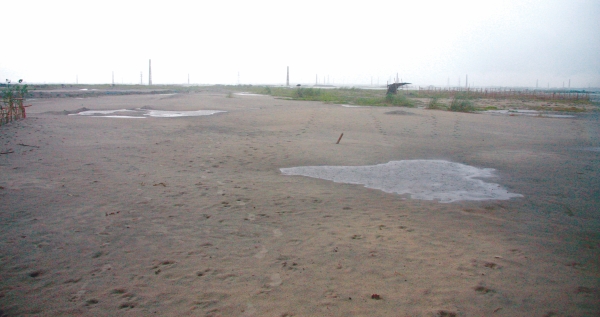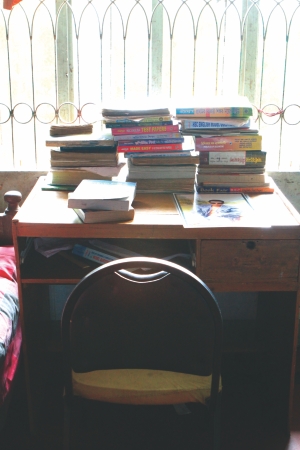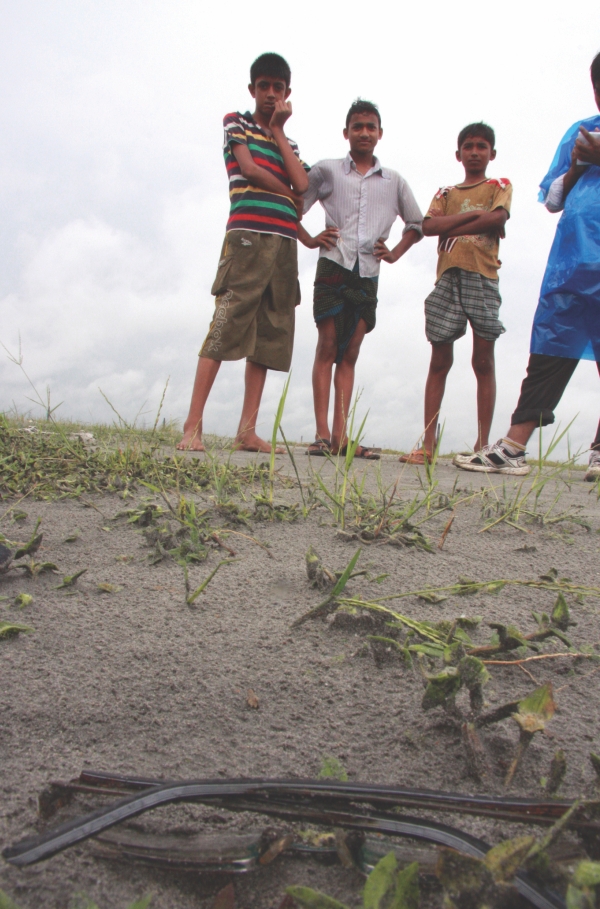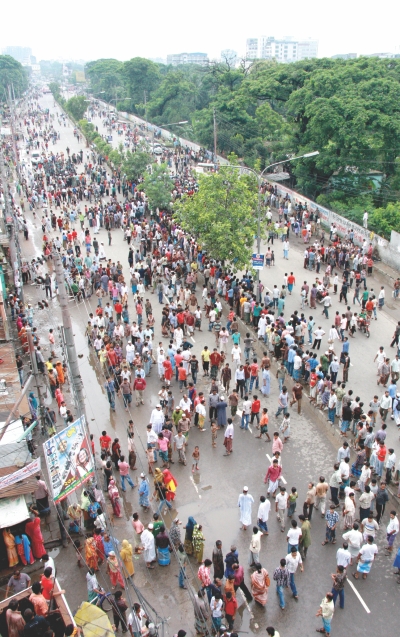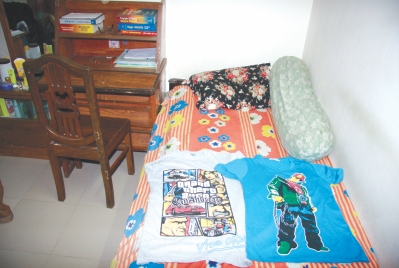| Home - Back Issues - The Team - Contact Us |
 |
| Volume 10 |Issue 30 | August 05, 2011 | |
|
|
Cover Story The Deadly Visit to Aminbazar On the night of Shab-e-Barat, Kusum Akhtar had busied herself cooking beef curry and preparing ruti and halua before she devoted the rest of the night to saying prayers. Her sick husband Abdul Quader was waiting for his son Kamruzzaman Kanto to return home. Although her overcrowded two-room ground floor flat, in the city's Darus Salam area did not have much to offer, she believed her days of struggle would one day be rewarded when her college-going eldest child Kanto would get a good job. She fed Kanto before he set out to join his college friends to go to the neighbourhood mosque to say prayers together throughout the night - a common religious norm practiced by Muslims in Bangladesh. However, only hours later she received a phone call from an unknown voice telling her that her son had been brutally killed by a mob for an alleged robbery attempt. Akhtar's world has since turned upside down not least because of the brutality her son had suffered before succumbing to his injuries. Although her faith in God remains unchanged, her perception of an ideal world has changed forever.
Rifat Munim "Would you call it justice? He had just enrolled in honours first year. Why did he have to be killed this brutally? I want an answer for this,” says a devastated Akhtar who has yet to get over the shock of receiving Kanto's battered corpse replete with severe gashes and swollen bruises. An all too similar fate awaited Shahnaz Parveen who, having lost her husband years ago, placed all hope on Sitaf Jabi Munif, her eldest child of two who was a private university student. “I just want my son back. Please give me my son back,” mutters Parveen. One of the holiest nights thus turned out to be the deadliest for four other families. Having finished their prayers at one of the local mosques at around one in the morning, a group of seven aged between 16 and 22 from Darus Salam, Shymoli and Kalyanpur areas had decided to wander about in search of adventure. Of the seven, Towhidur Rahman Palash, Kamruzzaman Kanto and Ibrahim Khalil were students of Bangla College, Shams Rahim Shamam of Maple Leaf International School, Tipu Sultan of Tejgaon College and Sitaf Jabi Munif was of Bangladesh University of Business and Technology. They reached Gabtoli and crossed the bridge on foot. Within minutes after they stepped in the truck stand in Aminbazar, located on the other side of the bridge, they were attacked and beaten to death by a group of people carrying sticks and sharp weapons.
“First we had tehari (a local food) at Gabtoli bus stand. Then we wanted to spend some time by the bank of the river Turag. Having reached the bank, we were strolling and at one point, we sat along the bank splitting in two groups. I was with Kanto and Palash Bhai. In a minute or two, we saw some people with torch lights approaching us and then we heard our other friends screaming. In the blink of an eye, we found ourselves circled by several men with sharp weapons in their hands. Then they started beating us without giving us any chance to talk,” says Al-Amin, the lone survivor among the group who is not a student and who is a sales representative of a juice company. Although one might raise questions about the purpose behind such an adventurous act on the part of those boys, no criminal records whatsoever were found about them either in the concerned Thanas or in their localities. Abdul Halim, the next-door neighbour of Ibrahim Khalil, says that he has been living in Darus Salam for more than two decades and has never seen Khalil or any of his friends especially Kanto and Al-Amin who belong to the same neighbourhood, involve themselves with any kind of anti-social or terrorist activities. “I know Khalil since his childhood and I've never seen him involved in any kind of objectionable activities. He was a decent young man with a lot of enthusiasm.” When this reporter visited the Hazi Boro Masjid area in Darus Salam, local people both young and old, shared Halim's view. Farida Yasmine, the land lord of Sitaf Jabi Munif, says that Munif's family has been living in her house at Shymoli for 13 years. “I've seen them for years. Munif was the eldest and only son of his mother and he was a bright student studying in a reputed private university,” she adds.
However, villagers of several villages, especially of Bardeshi village under Aminbazar union, have cooked up a different story altogether, insisting on the notion that the deceased were dacoits, not students. Crossing the Gabtoli bridge, on the left is Aminbazar truck stand after which is located the Bardeshi village. Behind the truck stand lies a vast expanse of sands which is known to be the city's biggest hub of illegal sand trading. In fact, encroachers over the years have illegally filled many parts of the Turag river turning it into a hub of illegal sand trading. Because of its location about two miles away from the bridge as well as the village, the place known as Keblarchar has also become a hot spot for unrestricted movement of terrorists and dacoits. It was this place where one of the infamous dacoit groups named the Gangchil Bahini killed two Rab officials. Terrorists involved with such activities, villagers allege, commit robberies in the Bardeshi village and also extort money from the sand traders. In the last few weeks, they add, several robberies had taken place in the village. However, Mahbubur Rahman, officer in-charge of Savar Thana, says that only one case was filed in this connection. As a result of frequent robberies, villagers had decided to patrol the area dividing themselves into several groups. On the night of the Shab-e-Barat one of the patrolling teams, they allege, spotted a gang of 15 to 20 dacoits landing on Keblarchar from a trawler. As the gang equipped with arms came closer to the village, the patrolling teams along with several hundred villagers attacked them and got through to catch seven while the others managed to escape. Abdul Malek, a sand trader in the area, went as far as saying that the group before trying to enter the village extorted five thousand taka from him. He also filed a case accusing the students of being members of a dacoit group. Another case was filed by Savar police against around 600 unnamed villagers in this connection. Denying all the allegations incorporated in the poorly fabricated story, Al-Amin says that they were within 100 metres of the bridge and knew nothing about the perils of Keblarchar. Talking about how the dead bodies were found in the char, he says, “As far as I can remember we were attacked within 200 metres of the bridge. May be the bodies were later dragged all the way to the char so that they could prove us to be dacoits,” he continues. “We were first attacked by a group of 20 to 25 people carrying sharp weapons. They all looked like criminals of some sorts. We told them repeatedly that we were not dacoits, we just came here to take a walk. We asked them to call our parents and verify if we were lying. But they didn't listen to anything. Instead, they seized our mobiles and money and kept attacking us brutally with the weapons. Dacoits carry weapons and attack back in defence whereas we did nothing except trying to convince them in vain.”
The students who have been accused by the villagers to be robbers do not have any criminal record as confirmed by the duty officers of the concerned Thanas of Darus Salam and Shymoli. Investigation officer (IO) Inspector Matiur Rahman also says, “It has been confirmed that they are students with no objectionable or criminal record in the concerned Thanas or in their own localities.” He however is sceptical of Al-Amin's version of taking a walk along the river bank and says, “I think they went to that place to buy or take drugs and then were victimised.” Locals and transport workers of Gabtoli allege that Bardeshi, the nearest village to Keblarchar, is one of the biggest drug dens on the outskirts of the city. They add that quite a good number of people of that village are involved in drug peddling especially cannabis, phensedyl and heroine. Kanto's father Abdul Quader, who has worked as a truck driver in the city since 1974, says that apart from trucking business drug peddling is one of the main sources of income for people of Bardeshi. He thinks that this is one of the reasons why acts of robberies are not reported to the Thana. He also alleges that drug peddlers may be involved both in robbery and extortion. Many villagers of Bardeshi refuse to talk saying they know nothing while those who agree to talk start by saying that they stayed home when the incident took place. Not a single person who took part in the killing spree that day seems to be available. Most villagers say that frequent robberies led them to organise vigilante patrols. Moreover, that night several hundred people gathered in the union graveyard located in Bardeshi which was why people's wrath could not be resisted. They hold police inaction responsible for taking the law into their own hands; and most of them deny that they were students of reputed schools and colleges with no criminal record. “Tell me why on earth anyone would go to Keblarchar if it was not for robbery,” says a local shopkeeper requesting anonymity. Quite a good number of villagers have echoed his opinion while some have admitted that they were not robbers but must have connections with drug peddlers. “They were students, no doubt. But may be they had come to buy drugs and fell victim to the villagers' wrath. The whole thing can be a misunderstanding,” says a truck driver.
Besides a local member along with a handful of villagers most others have admitted to the long-term existence of drug peddling based in that village. Bardeshi is divided into three parts: the east side (purba para), middle side (Madhya para) and west side (paschim para). After a little enquiry it is established that a lot of people especially from the east side are involved in drug business. A tenant living beside the graveyard reveals, “If you walk along the narrow streets during the day, many men and women will come to you offering drugs for sale. May be it is suppressed a little now following the death of the six students, still there are several groups operating now. When there is no risk, drug dealing increases to such an extent that badly affects all our lives.” An elderly man seeking anonymity has given away that the drug peddlers usually shift to the truck stand and the Keblarchar during the night.
“At night, incidents of scuffles as well as occasional violence are a common affair in the truck stand and Keblarchar because of the drug peddlers,” he says. Another truck driver has clearly indicated that the drug dealers are sheltered by high-ups and are also on good terms with the administration. Curiously enough, no one has been arrested in this connection and no case has been filed in the Savar Thana in the last six months. Considering the indomitable grip of the drug peddlers, one can fairly assume that they have some sort of links with illegal sand traders and robber gangs. Although OC Mahbubur Rahman admitted to his knowledge of drug-related crimes, he refused to make any further comment since the four-member high-powered investigation team led by Deputy Inspector General of Police Mohammad Amir Uddin has not submitted their probe report till writing this report. DIG Amir Uddin could not be reached despite repeated attempts. The Dubious Police Role The IO Matiur Rahman says, “We haven't got any new or significant information from them.” It is also not known whether those two are linked with the incident at all.
Meanwhile, students of Mirpur Bangla College and Tejgaon College and locals of Darus Salam, Shymoli and Kalyanpur areas have brought out several processions and formed human chains in many places demanding immediate punishment of the killers. Abu Taher, father of Ibrahim Khalil, says, “Now that it is proven that my son and his deceased friends were all students having nothing to do with robbery or any such thing, I demand that the robbery case filed against my son and others be withdrawn immediately.” Sheikh Farid, Tipu Sultan's elder brother, says, “First, I want the perpetrators to be punished. Then I want the government to put an end to all such events. I'd also like to request the government not to arrest and punish any innocent people in connection with this case as well as in any event.” Human Rights Activist Advocate Sultana Kamal says that mob violence or any kind of vigilante activities has become a long-existing practice in our culture because on the one hand people have very little faith in the legal system and on the other hand people know that they would be able to go scot-free after committing such a crime. “It's a creation of the State by not taking timely and appropriate action against perpetrators of crimes and allowing ordinary people to take the law into their hands by not holding them accountable. For example, anyone can get away after brutally inflicting physical pain on a woman by enforcing a fatwa or by killing a thug in a fit of mob violence.” In this regard, she also refers to State-sponsored extra-judicial killings by the Rapid Action Battalion (Rab) and says that whenever any crime remains unintervened by the legal system people show a tendency towards vigilante activities because they think if the perpetrators are not killed on the spot, they will find a way to get out. “In order to check mob violence the first step that must be taken is to create a law and order situation whereby no perpetrator will go unpunished. Only then will people resume their faith in the country's laws,” she emphasises. Copyright
(R) thedailystar.net 2011 |
|||||||||||||||||||
